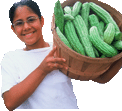Back to the Guide to Farming Table of Contents>>
An increasing number of grant programs are available to farmers from federal or state sources each with specific objectives. Grants fall into the three general types: 1) grants for business planning, adding value and increasing farm viability; 2) grants for on-farm research and demonstration projects that are mostly production oriented though some include marketing demonstration projects; and 3) grants for farm energy conservation, alternative energy, environmental protection/conservation and waste management.
Grants are never available to start a farm and are not a reliable strategy for growing your business. Grants may enable you to expand a particular aspect of your business to make your operation more viable or provide funding to try a new practice on your farm.
Grants are highly competitive so apply only if the project you are proposing clearly meets the grantor’s objectives. Always find out what kinds of projects were funded in the past to determine if your project is in line with what has been funded.
It takes significant time and effort to write a wining grant proposal. Instructions must be followed precisely. Grants often require a cash or in-kind match that must be documented in the budget you propose. Grants will not be considered if they arrive late after the deadline for application. Deadlines for application submission and instructions are generally announced once a year. Most grants are not available on an ongoing basis.
Once you submit a grant, it may take 3 to 6 months to find out if your application was selected for funding. If funded, it also takes time to finalize the contract. Generally you will not be reimbursed for money spent prior to receiving the signed contract. Grant contracts require that you write a report of the results and provide an accounting of how the money was spent; therefore, you must keep accurate records. Grants are also considered income for tax purposes.
Following is a list of some grant sources available for farm projects:
New York State Sources
www.agmkt.state.ny.us (click Funding Opportunities) or call 518-457-7076
NYS Good Agriculture Practices/Good Handling Assistance Certification Program (GAP/GHP)
The Department will pay up to $750 for having a private or NYS Dept. of Agriculture audit, including water tests, to verify a farm’s food safety program. This certification applies to produce farms and many retail and wholesale buyers are requiring GAP Certification for certain crops. Applications must be approved prior to the audit. Annual April deadline. Questions – 518-457-2090. (Funded by USDA Specialty Crops Program).
NYS Funding for Organic Certification
Purpose: Reimburse producers for a portion of their annual organic certification renewal costs; can apply annually.
Funding levels: 75% reimbursement up to a maximum of $750
Information: Ag & Markets – 800-554-4501
Website: www.ams.usda.gov/nop – National Organic Program information
Forms can be downloaded from: http://www.agmkt.state.ny.us/AP/Organic/docs/2009_Farmer_Application_Form.pdf
NYS Specialty Crops Competitive Grants Program
Purpose: Increase the competitiveness of specialty crops, encourage efficiency, partnerships, innovation, and new markets. The RFP includes many areas of focus including: packaging/labeling, environmental quality, distribution, education and outreach, food safety, food security, marketing and promotion, product development, plant health and international trade. 2009 awards were solely focused on plant health.
Eligibility: Funding available to non-profits, for profits, individuals, educational institutions, and government, however, individuals and businesses must partner with others.
Information: Likely to be available in 2011. Contact: or Tim Pezzolesi at 518-457-2716.
Grow NY Enterprise Program
Purpose: provide grants or loans to finance business expansion related to production, processing or marketing of agricultural products.
Eligibility: Municipalities under 50,000 (population) apply on behalf of farm enterprise. Must have other funding in place. Job creation required: 1 job per $7,500 invested.
Funding: Minimum of $100,000 up to $750,000 per community.
Information: Ag & Markets – 800-554-4501; http://www.agmkt.state.ny.us/GNYRFP.html
NYS Dept. of Ag & Markets – Agriculture & Farmland Protection Projects – MUST WORK WITH A MUNICIPALITY AND BE PART OF A COUNTY FARMLAND PROTECTION PLAN
Purpose: State assistance for the purchase of agricultural conservation easements (development rights) to permanently restrict development of valuable agricultural lands
Eligibility: Counties or municipalities with approved Ag & Farmland Protection – Farmers should contact county/town government if interested in the sale of development rights.
Funding: No cap; State provides 75% of the cost to acquire the easement; farmers or local government provides 25%
Information: www.agmkt.state.ny.us/RFPS.html
NYS DEC Water Quality Improvement Projects – CHECK WITH COUNTY SOIL AND WATER DISTRICT REGARDING PROGRAMS AND FEDERAL FUNDS FOR PROJECT IMPLEMENTATION
Purpose: Implement practices to improve water quality
Information: contact your county SWCD for information on local funds; funding is not competitive but funds are limited and must meet criteria for water quality protection.
NYSERDA-New York State Energy Research and Development Authority Programs – Loans, grants, incentives
Purpose: Several programs, incentives and loans for farm waste management (biogas); improved energy efficiency; solar and wind generation; and innovative business practices for energy conservation, alternative energy, and energy use. Energy audits available.
Information: 518-862-1090; toll free 800-NYSERDA or check www.nyserda.org – look at current funding opportunities for project descriptions and who to contact for details; For agriculture specific projects, the link is: www.nyserda.org/Programs/Agricultural/default.asp
Federal Sources
USDA-SARE/Sustainable Agriculture – Farmer/Grower Grant – GREAT SOURCE FOR ON FARM RESEARCH PROJECTS
Purpose: Support on-farm research demonstrations, marketing innovations, value adding activities and other projects.
Funding: capped at $15,000; capital improvements limited to $500 of total project cost; no match required; annual deadline in December
Information: 802-656-0471 website: www.nesare.org or email:
USDA Rural Business Cooperative Service – Value Added Agricultural Product Market Development Grant Program
Purpose: Encourage producers of commodities to refine products to increase their value – for feasibility studies, business and marketing plans, studies to establish a new venture; and working capital for established ventures with a business plan.
Funding levels: planning grants up to $100,000 and working capital grants up to $300,000
Information: 315-477-6409; website: www.rurdev.usda.gov/rbs/coops/vadg.htm
USDA Rural Business-Cooperative Service – Rural Energy for America Program
Purpose: Help farmers and rural businesses make energy improvements and install renewable systems. Three programs available: Energy Audit and Renewable Energy Development Assistance; Renewable Energy Systems/Energy Efficiency Improvement; and Renewable Energy Assistance Program – Feasibility.
Eligible projects: systems that generate energy from wind, solar, biomass, geothermal sources, energy efficiency improvements-upgrade equipment or processes; energy audits
Funding levels: varies with program (see info on website)
Information: website: http://www.rurdev.usda.gov/rbs/farmbill/index.html or contact NY Energy Program Coordinator – Thomas Huaryski at 607-776-7398 ext. 132; email: Thomas.Huaryski@ny.usda.gov
USDA NRCS – Farm Bill Initiatives for Conservation Practices
Purpose: The Farm Bill authorizes several new initiatives geared at land conservation and water quality protection.
Information: find out what is available by contacting your county or regional USDA Service Center. Websites: www.ny.nrcs.usda.gov or call 315-477-6503
USDA Rural Development – Value-Added Producer Grants
Purpose: To help producers or producer cooperatives increase farm income, create new jobs, contribute to community and rural economic development, and enhance food choices for consumers. The term “value-added” includes an agricultural commodity or product that has undergone a change in physical state or was produced, marketed, or segregated (e.g. identity-preserved, eco-labeling, etc.) in a manner that enhances its value or expands the customer base of the product.
Information: Contact your State Rural Development Office – locate it here: www.rurdev.usda.gov/recd_map.html. For more info on the grant program, visit www.rurdev.usda.gov/rbs/coops/vadg.htm (the official site) and also http://sustainableagriculture.net/publications/grassrootsguide/local-food-systems-rural-development/value-added-producer-grants/
Check websites for deadlines, applications forms and lists of previously funded projects.
This fact sheet is part of the Guide to Farming in NY by Monika Roth et al, published by the Cornell Small Farms Program and Cornell Cooperative Extension. Fact sheets are updated once annually, so information may have changed since last revision. If you are reading a printed version of a fact sheet, compare revision date with online fact sheet publish dates at https://nebeginningfarmers.org/publications/farming-guide to make sure you have the latest version.

 Information for beginning farmers.
Information for beginning farmers.
